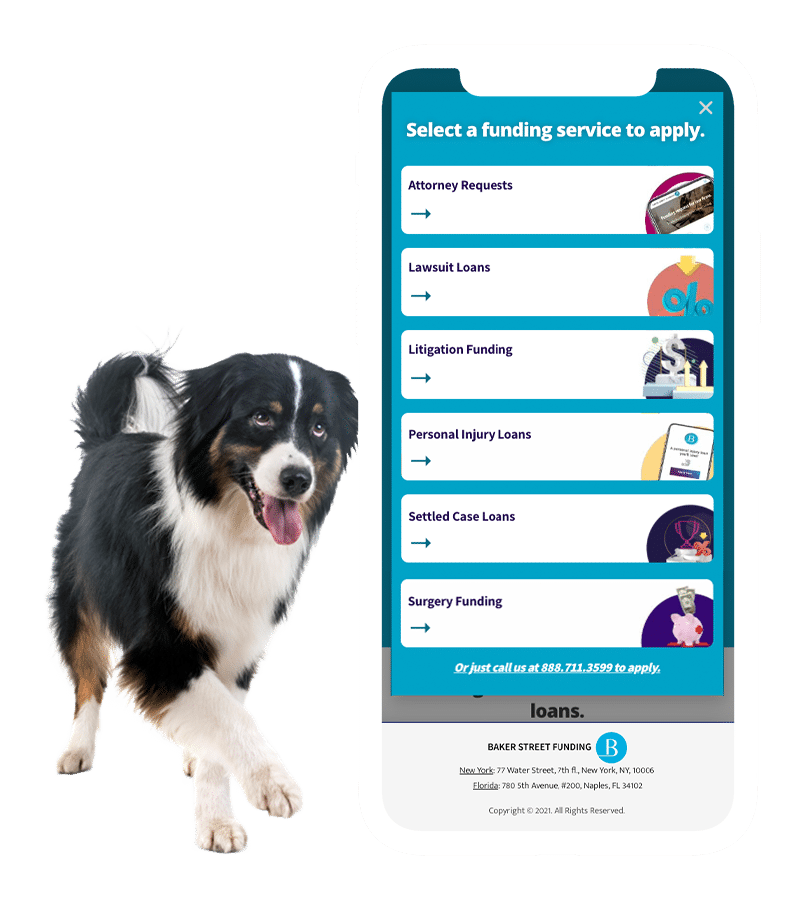Unlock immediate financial relief with pre-settlement funding — secure your funds in less than 24 hours.
Lawsuits can take time, but your bills can’t wait. Get immediate cash relief with our no-risk pre-settlement funding—repay only if you win your case. Cover essential expenses with no credit checks, or employment verification needed.
Your peace of mind is just a click away—start rebuilding today.
Are you an attorney? Learn more about how Baker Street Funding can assist you with your legal funding needs. Contact us today.



Transparent pre-settlement funding—no misleading terms , just honest support.
Pre-settlement funding, often referred to as a ‘lawsuit cash advance,’ serves as a financial lifeline, offering you rapid access to a portion of your anticipated settlement without the usual limitations of other financial solutions.
Unlike traditional loans, or what some lenders misleadingly refer to as ‘lawsuit loans,’ pre-settlement funding is not a loan but rather a non-recourse advance. That means you only have to repay the funds if your case is successful. There’s zero risk involved as you are never ‘on the hook’ for the funding you receive if your lawsuit does not result in a favorable outcome—despite what some may claim.
Experience the Baker Street Funding difference—where trust and integrity lead the way.
Choosing Baker Street Funding means you are partnering with a premier legal funding company that deeply understands the law and upholds the utmost transparency and integrity, free of the usual risks and limitations of the traditional lawsuit loan company. Our commitment to clear and fair funding agreements is reflected in our voluntary adherence to consumer protection.
Headquartered in Naples, Florida, we specialize in providing non-recourse funding for plaintiffs awaiting settlements for personal injury and other civil lawsuits in 42 states.
Access fast pre-settlement funding from the nation’s most reputable funding company and get the financial stability you need during this critical phase of your lawsuit. The money can be used for anything—medical bills, rent, groceries, or other living expenses while your case progresses.

Absolute zero risk
Our funding is strictly non-recourse. That means if your case doesn't result in a settlement or court award, you won't have to repay us a single cent. This feature makes our funding solutions a secure choice for all your lawsuit financing needs, free of any financial risk to you.

Immediate financial relief
As a leading pre-settlement funding company, we understand the urgency of your financial needs, which is what drives us to provide prompt results. Experience quick and efficient processing with approvals typically completed within 24 hours—quicker than industry norms.

No credit check required
You deserve fair access to justice, no matter your financial past. That's why we solely focus on the merits of your case rather than your credit score, offering equitable and accessible funding for all plaintiffs.

Competitive and fair rates
Our rates start at just 2.95% per month, capped at 36 months. Unlike many providers, we offer transparent pricing with no hidden fees to protect you from the unpredictable costs often associated with lawsuit loans.

Unmatched client support
Each client receives personalized attention from a dedicated funding specialist who understands your financial needs and expertly guides you through the process.

Total transparency
We operate with complete openness—no hidden contracts, no fine print. You’ll always have access to complete information about your pre-settlement funding options, and make decisions that best serve you.
Your best friend in lawsuit financial recovery—how to apply.
Applying for pre-settlement funding shouldn’t be a hassle. We’ve made our process as easy and friendly as checking your phone — just ask our Aussie Shepherd!

Initial Consultation
Simply fill out our online form or give us a call. Share the basics of your case and your attorney's contact information, and let us start tailoring our support

Case Evaluation
Our expert team will carefully review your case details alongside your attorney, focusing on the strengths to determine the best funding solutions available to you.

Funding Offer
If your case meets our criteria, you’ll quickly receive a detailed offer, outlining the funds you can access and the terms.

Funds Disbursement
Agree to the terms and, upon signing the agreement, expect the funds in your bank account the same business day, so that you don’t miss a beat in your financial or legal plans.

Start your journey with a trusted pre-settlement funding provider committed to enhancing your funding experience—the best is yet to come.

Pre-settlement financial solutions trusted by thousands of clients nationwide.
Trusted by plaintiffs and attorneys nationwide, Baker Street Funding is recognized as the No. 1 pre-settlement funding company in North America. With a 98% client recommendation rate and over $50M in legal financing provided last year alone, our record speaks for itself. Hear directly from those we’ve helped.
Explore first hand accounts from clients across the country and see how we can help you too.
“I am so thankful I got courteous help, I was guided through the litigation loan financial process and this company convinced me to take less money and take out funds only as needed. These people actually care about you and as far as the rates go they were non-compound. And if you need some extra cash from whatever lawsuit you got. don’t go with anyone else.”
Ms. Rivera


Calculate your lawsuit loan savings.
Discover how reducing your interest rate and monthly payments can significantly decrease the total interest you pay. Use our lawsuit loan calculator to see real-time savings and make the best financial decision for your situation.
Apply in minutes— get funded fast without any hidden risks.
Financial troubles during a pending lawsuit don’t favor anyone, and our funding solutions are equally impartial at Baker Street Funding. With us, you gain access to quick financial relief without the headaches often seen with traditional loans. With low, competitive rates and transparent terms, Baker Street Funding helps you keep more of your settlement for your recovery and future needs.Transparent Terms
Know exactly what you're getting with transparent terms—no hidden fees, no surprises.
Quick Access
Apply today and receive funds in as little as 24 hours.
Risk-Free Pre-Settlement Funding
There’s absolutely no repayment obligation unless you secure a settlement.

FAQ.
Is there a difference between a lawsuit loan and pre-settlement funding?
Many people wonder about the difference between lawsuit loans and pre-settlement funding, often due to confusing or misleading information on the market. In reality, the terms ‘lawsuit loans’ and ‘pre-settlement funding’ refer to similar types of financing designed to help plaintiffs manage their expenses during litigation.
Both provide necessary funds based on the future compensation of your lawsuit. However, what sets our services apart is their non-recourse nature. This means that repayment is contingent upon the success of your case. If you do not win or settle your lawsuit, you owe us nothing. Unlike traditional loans, our pre-settlement funding does not require credit checks, employment history, or any financial vetting. This approach is designed to provide financial support accessible to anyone undergoing litigation, thereby reducing financial risk during a potentially vulnerable time
Is pre-settlement funding worth it?
Absolutely, pre-settlement funding can be a vital resource if you’re facing financial difficulties while awaiting the resolution of your lawsuit. It provides you with a cash advance based on the potential settlement of your lawsuit to help you manage your living expenses, medical bills, and other necessities before your case settles.
This type of funding can also bridge the financial gap when you’re waiting for a settlement that could take months or even years to be finalized. It relieves the pressure to accept a lower settlement due to financial strain, providing a practical solution to maintain your life-style throughout the legal process. With this support, you can hold out for a fair offer as your lawyer works towards securing the settlement you deserve.
How do I borrow money from a pending lawsuit?
Borrowing money against a pending lawsuit is easy with pre-settlement funding. Simply start by filling out an application with a reputable funding company like Baker Street Funding.
We’ll review your case details in collaboration with your attorney to determine the amount you can receive.
How to get settlement money fast?
To get a portion of your expected settlement money quickly, make sure your attorney is fully cooperative and provides all the necessary case documentation to the funding provider. Legal funding companies like Baker Street Funding often process applications fast, and once approved, the funds can be available in as little as 2 hours.
How much does pre-settlement funding cost?
At Baker Street Funding, we believe in transparency and affordability. The cost of pre-settlement funding with us starts at just 2.95% per month, non-compounding, capped in 3 years.
Contrary to many others, we don’t hide fees or spring surprises on you. Every term is clearly explained from the get-go, enabling you to make educated choices with confidence. Choose Baker Street Funding for clear, dependable financing tailored to the value of your case.
How do I know if a settlement offer is fair?
Assessing the fairness of a settlement offer requires a nuanced understanding of legal and financial factors. It is essential to consult with your attorney, who can evaluate the offer in the context of the legal merits of your case, precedent, and compensatory needs related to your specific circumstances.
A fair settlement should compensate not only for immediate losses but also for any long-term consequences resulting from the incident.
Why can’t I get a pre-settlement loan?
There could be several reasons for denial, such as lack of sufficient evidence in your case that doesn’t meet the funding company’s criteria, or not having an attorney. To increase your chances, make sure all paperwork and case details are thoroughly prepared and presented by your lawyer.
What are the cons of pre-settlement funding?
While pre-settlement funding offers significant advantages, it’s important to consider factors like the cost of funding, which might include fees and interest rates that accrue until your lawsuit settles. Always review the terms carefully with your attorney to make an informed decision.
What cases do you fund?
- Personal Injury: Auto accidents, medical malpractice, wrongful death cases, slip and fall and more.
- Labor and Employment: Workers’ compensation claims, employment discrimination, and more.
- Civil Rights: Cases involving discrimination, police misconduct, wrongful imprisonment, and other civil rights violations.
- Others: Commercial litigation, qui tam, probate cases, and more.
What states do you fund?
How does Baker Street Funding protect my privacy and the integrity of my case?
Our pre-settlement funding solutions are designed to arm you with security and support throughout your lawsuit, while rigorously maintaining the confidentiality of your financial and legal information. We respect the sanctity of the attorney-client privilege, so that our processes never compromise the privacy and integrity of your case.
Check out what else we got to offer.
To date, we’ve empowered thousands of claimants and attorneys, and we’re just getting started. Our comprehensive, non-recourse settlement funding solutions mean that our success is directly tied to yours. Depending on your case details, you could qualify for anywhere from $1,500 to over $20 million in funding. We currently offer funding for personal injury plaintiffs in 42 states and to attorneys in the majority of states.
Prioritize your health with timely access to necessary medical treatments for your personal injury.
Explore more funding options, consolidate previous advances from other lenders, and save on interest
Obtain the needed financial assistance during your workers’ comp case. Available in select states.
If your lawsuit settled for $50,000 or more, qualify for post-settlement funding in just minutes.
Secure effortless lawsuit financing to cover case costs, or help your client cover living expenses while you litigate.
Support your commercial litigation efforts with readily available capital.
Ready to give it a try?
Secure pre-settlement funding with the best company nationwide.
At Baker Street Funding, we don’t only comply with industry standards—we set them by offering fair rates and transparent terms in every transaction. Choose Baker Street Funding for ethical funding solutions in a in a market that can often be unpredictable.







